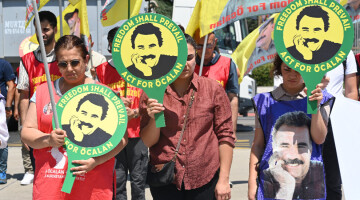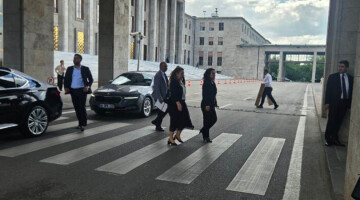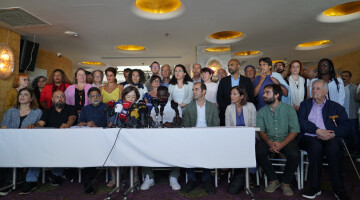The German state continues subjecting Kurdish political activists to repression and criminalizing Kurdish institutions, as a result of which 6 Kurdish politicians have been arrested this year.
At the moment, 8 Kurdish political activists remain in German jails under heavy circumstances. All these stand trial in accordance with the Article 129b, which requires a particular approval by the Ministry of Justice.
Lawyers for Kurdish politicians jailed in Germany did previously apply to the Ministry of Justice demanding the revocation of the particular approval for the implementation of Article 129b for Kurdish prisoners. The Ministry is, however, yet to answer the application.
WHAT IS THE ARTICLE 129B?
129b was among the most controversial anti-terror acts put into force by Germany after the 11 September attacks in 2003 to "smooth the international fight against terror". The act enables the trial of persons and groups involved in any kind of political act of violence outside Germany.
129b is grounded on the European Union's list of terrorist organisations in which the PKK was included on 2 May 2002.
THE KURDISH POLITICIANS CURRENTLY JAILED IN GERMANY
Metin Aydın: Remains jailed in Germany for some 3 years since his arrest in Switzerland as a result of pressure by the German state. He was brought to a Germany prison after being held in custody in Switzerland for a long time.
Abdullah Şen: Jailed for 3 years despite there being no act of violence attributed to him.
Mehmet Demir: Jailed for over a year with no evidence available as to a related crime committed by his side.
Ahmet Çelik: A well-known Kurdish politician jailed since July. In the face of the political repression in Turkey, Çelik was forced to migrate to Germany where he faced similar pressure as he presided the Federation of Kurdish Associations in Germany, YEK-KOM. He remains in prison despite his need of daily treatment to deal with serious health problems he is suffering.
Bedrettin Kavak: Jailed in Germany since August. Kavak remained in Turkish prisons for a total of 24 years for political reasons. He suffered heavy torture in Amed prison in 1980. He later took refuge in France for treatment of his severe health problems, in spite of which he has been jailed by the German state.
Kenan Bastu: Jailed since October, Bastu is a Kurdish politician who once presided the People's Assembly in Paris and later coordinated HDP's election activities in Hannover. It grabs attention that Bastu was arrested soon after Angela Merkel's visit to Turkey on 18 October.
Mustafa Çelik: Jailed since his arrest in the wake of a raid by German police while receiving treatment in November. The German state is making Çelik's health problems get severer after he suffered an injury as a result of attacks by the Turkish state. Similarly to Kenan Bastu, Çelik was arrested soon after Merkel's visit to Turkey.
Ali Özel: Jailed in Germany for over a year despite there being no evidence available.
KURDS WERE MASSACRED BY GERMAN ARMS
The German state became a party to the Kurdistan war and took side by the Turkish state during 90's. Following the unification of Germany, 300 thousand kalashnikov rifles remaining from Eastern Germany, as well as 300 BTR-60 infantry tanks, 5 thousand machine guns, 100 thousand B-7, RPG rocket guns and 445 million bullets were granted to Turkey. The Turkish state perpetrated massacres in Kurdistan with these guns.
WHY DOES GERMANY SUPPORT A STATE THAT PROTECTS ISIS?
As Kurds continue fighting against ISIS barbarity on behalf of humanity, the German state has also become a part of the Turkish state's war against Kurds since 24 July.
While it remains understandable that Turkey attacks Kurds to protect the ISIS, it raises question marks and suspicions why the German state is supporting Turkey which supports ISIS. Kurdish institutions evaluate this policy of the German state as an indirect support and morale to the ISIS.











